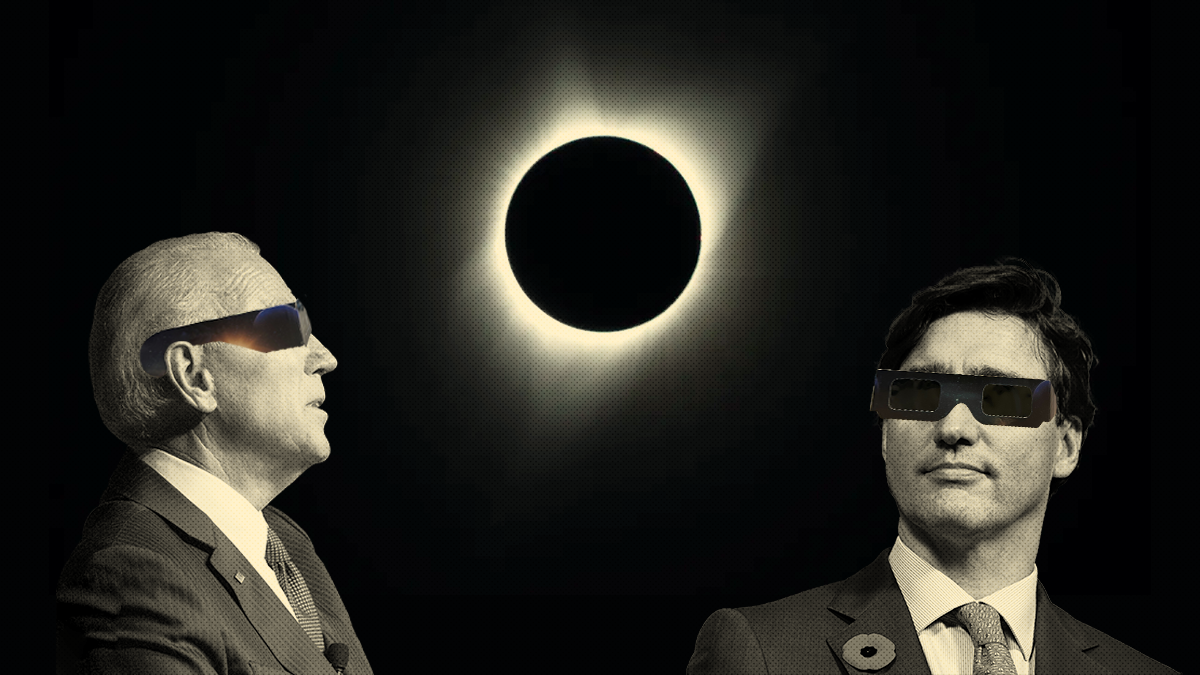Why are Joe Biden and Justin Trudeau getting so badly eclipsed by the great totality of critics? Can good policies seize back the agenda of a lagging campaign?
President Biden is busy touting his positive economic record but is baffled when it gets eclipsed by issues like his age. He rightly touts creating 300,000 new jobs in March and dropping the unemployment rate to 3.8%, but the headlines still say he looks like a guy who might as well have watched a solar eclipse alongside Moses.
Want to brag about the bullish stock market? Biden could, but that’s overshadowed by news this week about stubbornly high prices on gas, rent, and groceries. Want to shed some light on an economic recovery? Nice try. Word that the Fed may delay rate cuts clouds it over. How about projecting US strength in the world and containing a wider war with Iran, which the US has been doing? That’s undermined by the Hamas-Israel war and the casualties in Gaza that the US appears to have little influence over.
Meanwhile, every day Donald Trump does something so astronomically weird – selling golden shoes or hawking mash-up Constitution-Bibles – that all political telescopes end up turning his way first. So all that good economic result and that big fundraising advantage, so far, has not done much for Biden.
In Canada, Prime Minister Justin Trudeau is also having trouble staying unblocked. After eight long years in office, you now need to consult with Stephen Hawking on black holes to figure out if any light can escape from the event horizon of the Liberal campaign. This morning,Abacus Data released a poll showing the Conservative Party is 20 points ahead of the Liberals, the highest ever.
That kind of polling eulogy is why Mr. Trudeau is hemorrhaging leaks about his upcoming April 16 federal budget in order to recapture the penumbra of popularity he had when he was first elected. Can these new shiny programs do the trick?
- On April 1 came the CA$1 billion national school food program to ensure over 400,000 kids get school meals annually over the next five years.
- Then came the new national defense policy, “Our North, Strong and Free,” which focuses on Arctic and cyber security, increasing spending by CA$8.1 billion over the next five years, which will push Canada’s spending up to 1.76% of GDP. It’s not quite at the NATO prenup agreement of 2%, but closer.
- There is another CA$1.5 billion for a new Canada Rental Protection Fund to spur more affordable housing and rental units and then, boom, another $600 million in loans and funds to help new owners and renters.
- Oh yes, and CA$2.4 billion for the AI industry to make sure Canada doesn’t take the Large Language Model hit on the chin.
Has it worked? Have the giant budget leaks reframed the Trudeau government’s political fortunes? And more broadly for any government, can new ideas actually change political fortunes?
So far, the evidence is scant. The Abacus poll actually asked the question, “do budgets move votes?” and used the national school food program as a case study. Turns out, most folks didn’t even know about it yet. “Less than half of Canadians were aware of the program announcement” and worse, “parents with kids aged 3 to 14 years of age were actually less likely to be aware of the announcement (41%) than everyone else.”
What does that tell us? That no one is listening to Trudeau – that he’s being tuned out? Or is it more that the media is so fragmented that it takes more time to sell programs these days? Or, maybe that program got drowned out by the other four or five other announcements that spilled out.
Instead of selling voters on one big, new idea to frame the election, Trudeau has set out a smorgasbord of bureaucratic bonanzas with no central theme. Restaurants that serve buffets rarely get Michelin stars.
But here is where the political eclipse gets really weird: The programs being pitched by the Liberal leader … are extremely popular, even with people who oppose Trudeau.
“68% of current Conservative supporters think [the national school food program] is a good or acceptable idea,” according to the Abacus poll. And even stranger, “2 in 3 of those who have a very negative impression of Justin Trudeau think it's a good idea.”
That means even if you have ideas people really like, sometimes it will not change voter intention. “It is like the Prime Minister is a shepherd with no flock,” Abacus CEO David Coletto told me. Biden has the same issue. Even though the economic numbers are good, the narrative frame of negativity is hard to shatter.
That doesn’t mean that opposition leaders – Pierre Poilievre or Donald Trump – have a lock on winning. There is lots of time ahead, and campaigns matter. Trump will have to do more than be a vindictive doomsayer campaigning as the Count of Counterfactuals (“none of these terrible events would have happened if I were President!!!,”he says of inflation and the war in Ukraine, claims which are, of course unprovable), and Poilievre might have to get off Mean Street and move to Main Street. But at least people are listening to them.
Politicians think if people look directly at their records, they will see something truly beautiful. But it turns out that direct scrutiny often blinds the electorate to their message, and voters either turn away or grab a set of glasses the opposition conveniently gives them in order to change their view.
And that’s why a political eclipse is so fascinating: When even the best policies, the ones people really like, no longer illuminate the way, it’s hard to know which way to look.
– Evan Solomon, Publisher
